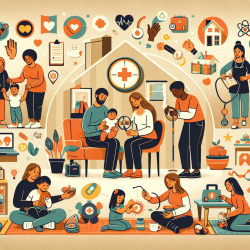Introduction
In the realm of healthcare, particularly for marginalized groups, understanding and addressing barriers is crucial for effective service delivery. The research article titled "Barriers to sexual and reproductive healthcare services as experienced by female sex workers and service providers in Dhaka city, Bangladesh" provides valuable insights into the challenges faced by female sex workers (FSWs) in accessing necessary healthcare services. This blog aims to translate these findings into actionable strategies for practitioners, enhancing their ability to deliver effective and compassionate care.
Understanding the Barriers
The study highlights several barriers faced by FSWs in Dhaka, which include financial constraints, stigma, and inadequate service provision. Financial problems were reported by 72% of the respondents, while 52.3% felt ashamed to seek care. Unwillingness of service providers and unfriendly behavior were also significant barriers, reported by 39.9% and 24.4% of the respondents, respectively.
Strategies for Practitioners
- Enhance Financial Accessibility: Implementing sliding scale fees or partnering with organizations to subsidize costs can alleviate financial burdens for FSWs.
- Foster a Non-Judgmental Environment: Training for healthcare providers on cultural competence and sensitivity can reduce stigma and improve the willingness of FSWs to seek care.
- Improve Service Availability: Expanding the range of services offered at drop-in centers, including contraceptive and STI services, can address unmet needs.
- Strengthen Referral Systems: Establishing clear, accessible referral pathways and ensuring FSWs are informed about available services can improve healthcare access.
Encouraging Further Research
While this study provides significant insights, there is a need for further research to explore the effectiveness of interventions aimed at reducing these barriers. Practitioners are encouraged to engage in or support research initiatives that focus on innovative solutions to improve healthcare access for marginalized populations.
Conclusion
By understanding and addressing the barriers identified in this study, practitioners can significantly improve healthcare outcomes for FSWs in Dhaka. Implementing data-driven strategies and fostering a supportive environment are key steps towards achieving equitable healthcare access.
To read the original research paper, please follow this link: Barriers to sexual and reproductive healthcare services as experienced by female sex workers and service providers in Dhaka city, Bangladesh.










